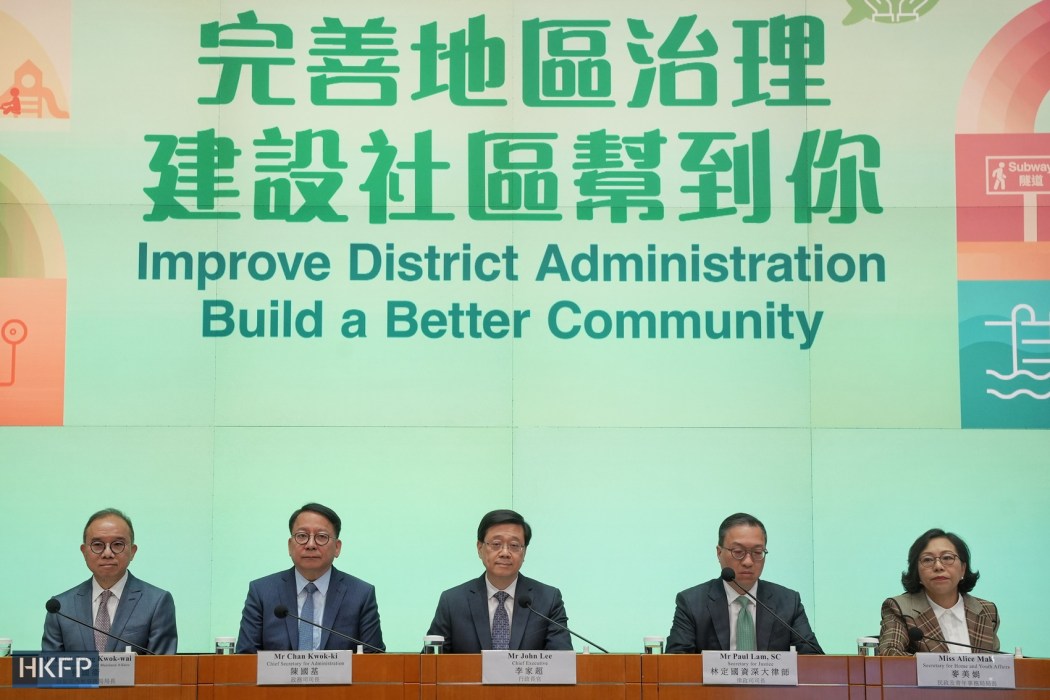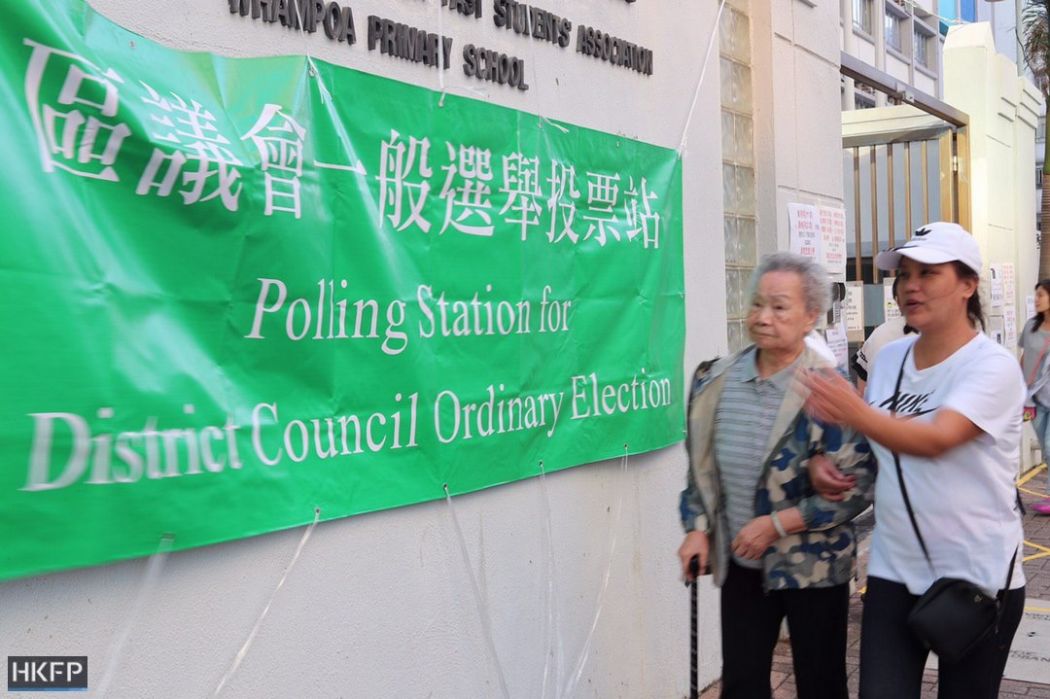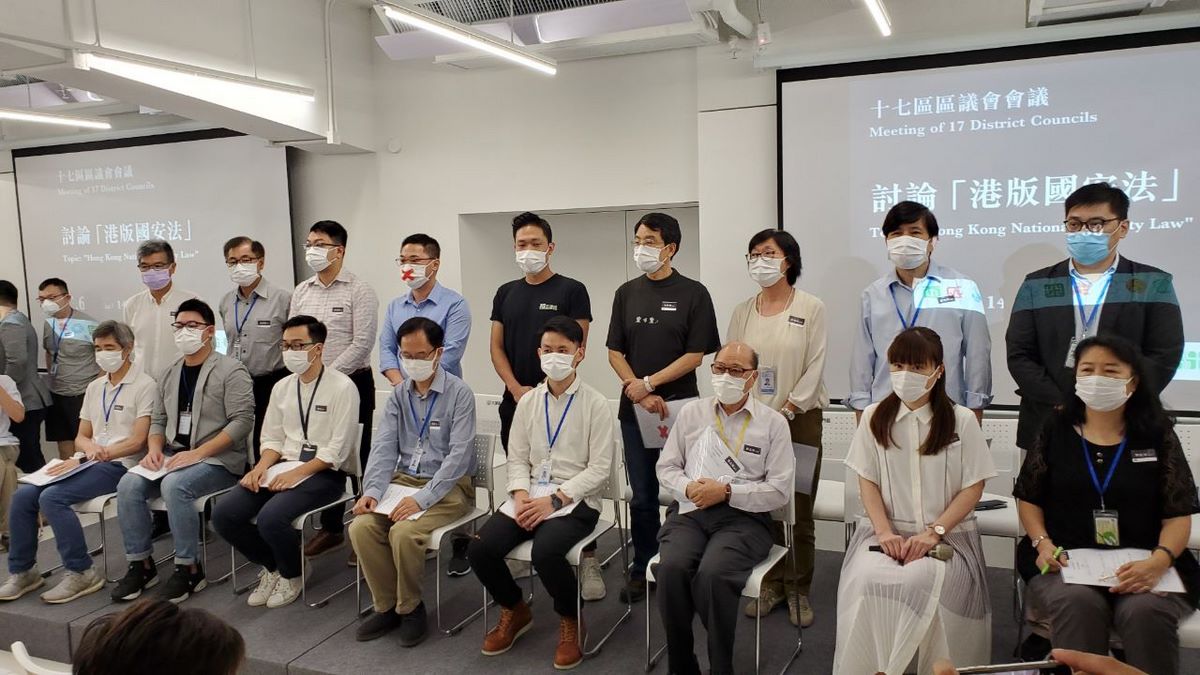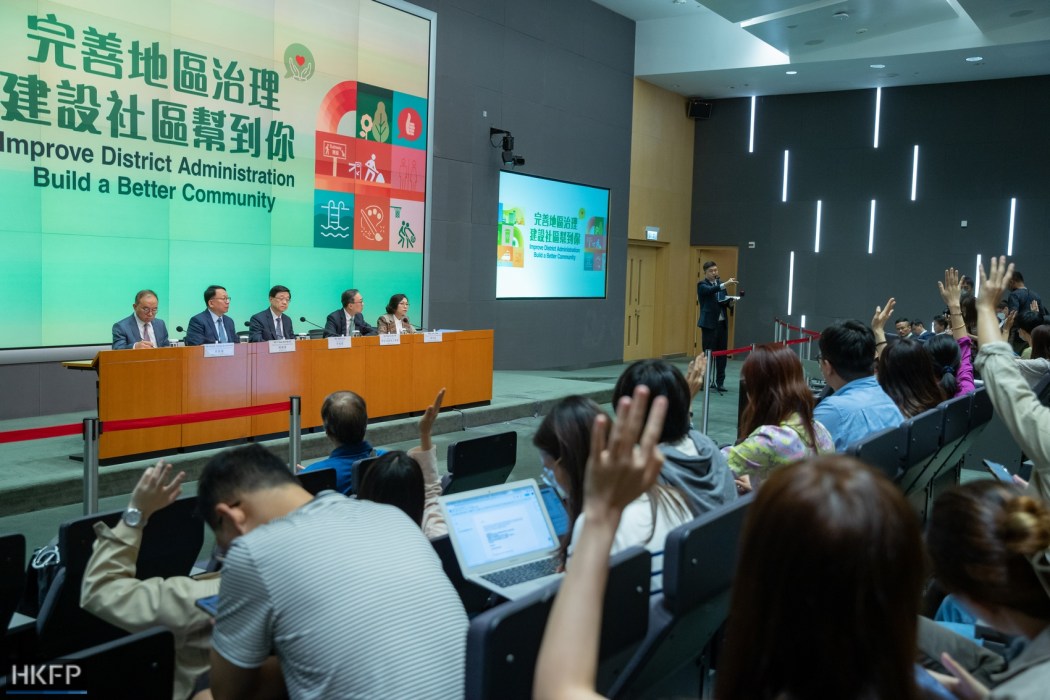When the Hong Kong government announced plans to overhaul District Council elections following a pro-democracy landslide in 2019, a spotlight was shone on three local-level committees in each of Hong Kong’s 18 districts.

In total, these three committees – the Area Committees, District Fight Crime Committees, District Fire Safety Committees – will hold 176 seats of the 470 available in District Councils under the government proposal, double the 88 democratically-elected positions.
On top of that, candidates who seek to run in the district-level election will also have to secure at least three nominations from each of the three committees.
Introducing the election overhaul on May 2, Secretary for Home and Youth Affairs Alice Mak said it would be “very appropriate” for the three committees to suggest candidates who were familiar with the community, as they “have served the local districts for a long time.”
But how are the committees formed, who sits on them, and how have their powers expanded over the past few years? HKFP explains…
How are the committees formed?
All members of the three committees are appointed by the director of home affairs.
Area Committees were established in 1972 when Hong Kong was still under British colonial rule. According to a document of the provisional Legislative Council (LegCo) – the city’s interim legislative body between 1997 and 1998 – the purpose of these Area Committees was primarily to “promote public participation in the Keep Hong Kong Clean Campaign and Fight Violent Crime Campaign.”
At the time, Area Committees were not considered necessary for all districts. Both the North and Tai Po districts operated without such committees until 2021. According to the provisional LegCo document, their function was already being performed by “other long-established local organisations.”
District Councillors also used to sit on Area Committees, as former secretary for home affairs Patrick Ho told veteran democrat Martin Lee, then serving as a lawmaker, in 2006.
But since the pro-democracy camp’s landslide victory in the last District Council elections amid the 2019 protests and unrest, few have been invited to join the Area Committees by the director of home affairs.

When members of the Eastern District Council asked about changes in the composition of the Area Committee in their district in 2020, the Home Affairs Department said that the government had been “appointed people based on their talents.”
The department said a person’s “ability, expertise, experience, honesty and passion in serving the society” would be among the factors considered for appointment, as well as whether they could “sufficiently cater for the functions and nature of work of Area Committees.”
The matter was also discussed by the Tuen Mun District Council in November 2020, during which District Officer Aubrey Fung said “the government reckoned that the [District Councils] had already been given plenty opportunities and had a platform to voice their opinions on community matters.”
“To hear other views, other community representatives with aspirations to serve society were appointed to the current-term [Area Committees].” Fung added.
District Councillors, meanwhile, have not explicitly been excluded from the District Fight Crime Committees or the District Fire Safety Committees.
In the past, the term of service for Area Committees was set at two years. In January this year, the Department of Home Affairs changed the span of service to one year when appointing the latest Area Committee members. This made the length of office identical across the three committees.
Appointed after election losses
Currently, there are 1,559 members of Area Committees across all districts, while the District Fight Crime Committees have 499 members, and the District Fire Safety Committees have 487.
While all members of all three committees have always been appointed by the Hong Kong government, political scientist Ivan Choy told HKFP that in the past, figures from the pro-democratic camp would be among those appointed.
However, Choy, a senior lecturer at the Department of Government and Public Administration of the Chinese University of Hong Kong, said democrats had not been appointed to the committees in recent terms.
According to a 2020 report by HK01, at least 96 pro-establishment figures who lost in the 2019 District Council elections were later appointed to different Area Committees.

As for the Area Committees appointed in January this year, InMedia reported that many of the pro-establishment candidates who were voted out in the previous local election remained as committee members.
Former police commissioner Tang King-shing was appointed to the Kai Tak Area Committee.
A week before Beijing enacted the national security law in Hong Kong on June 30, 2020, the chairs of all District Fight Crime Committees together with 33 former leaders of the groups petitioned in support of the implementation of the security legislation.
New powers, old remit
Before Beijing overhauled Hong Kong’s electoral system in 2021, the scope of work for these three committees was entirely restricted to district-level matters.
The Home Affairs Department wrote on its website that the function of the Area Committees was to promote public participation in district affairs, advise on local-level issues, assist with community activities, discuss matters of public interest, and support the implementation of district administration.
For the District Fight Crime Committees, their role was to monitor the state of law enforcement, assist police on fighting crime, promote the police-public relationship, and advise on measures to combat crime.
As for the District Fire Safety Committees, their responsibilities mainly revolved around promoting awareness of fire prevention and building safety.

Following the 2021 election overhaul, District Councillors were ejected from the new Election Committee, which was given the power to screen candidates running in legislative elections on top of electing the city’s leader.
After the 2019 local election – in which the pro-democracy camp swept 17 out of 18 seats – the District Councils were criticised by top officials and pro-establishment figures for being “extremely politicised” and accused of “stirring conflicts” in society.
As part of the 2021 overhaul, 156 seats were created for the Election Committee. Candidates for these seats would come from the three committees, and be voted for by their members. Those elected to the Election Committee would be given the chance to run in the Legislative Council’s Election Committee constituency, as well.
When introducing the plans to revamp the local elections, government officials often cited the Basic Law, which states that district organisations were not meant to be “organs of political power.”
On May 12, the Secretary for Constitutional and Mainland Affairs Erick Tsang told a legislature panel meeting that district organisations do not hold “political powers such as lawmaking, tax collection, or monitoring the government.”
Pending approval of the proposed changes to the District Councils’ administration, these three committees will be given even greater power in Hong Kong’s representative system.
Ivan Choy told HKFP that under the planned changes to the District Councils, the authorities consider the committees as “more of an extension of the administration” rather than as elected representatives of public opinion.
Meanwhile, the political scientist added that the government’s moves to extend the power of these local committees, while restricting the discussions of “city-wide political issues” at District Councils, “would make people feel that [the government] is self-contradictory.”
On May 10, government officials prematurely left a meeting of the Sham Shui Po District Council while councillors attempted to discuss the proposed electoral reform, claiming the matter was out of the district advisory body’s remit.
Support HKFP | Policies & Ethics | Error/typo? | Contact Us | Newsletter | Transparency & Annual Report | Apps
Help safeguard press freedom & keep HKFP free for all readers by supporting our team

LATEST FROM HKFP
HKFP has an impartial stance, transparent funding, and balanced coverage guided by an Ethics Code and Corrections Policy.
Support press freedom & help us surpass 1,000 monthly Patrons: 100% independent, governed by an ethics code & not-for-profit.










